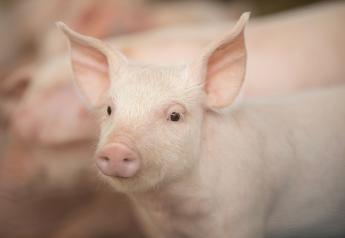Virus-Resistant Pigs Provide Answers to Global Threats

Researchers have successfully produced a litter of pigs that are genetically resistant to the deadly Transmissible Gastroenteritis Virus (TGEV) that infects the intestines of pigs, causing almost 100 percent mortality in young pigs.
A team of researchers from the University of Missouri (MU), Kansas State University (KSU) and Genus plc has succeeded in breeding pigs that are resistant to the virus by means of gene editing.
“It’s a tremendous financial burden for farmers to put time, money and labor into animals that will get sick,” says Kristin Whitworth, co-author on the study and a research scientist in MU’s Division of Animal Sciences. “Breeding pigs with genetic resistance will help to ease that burden. In terms of animal welfare, if we can prevent these pigs from getting sick, we have a responsibility to do so.”
Gene editing identifies solutions
Previous research had identified an enzyme called ANPEP as a potential receptor for the virus, meaning it could be an important factor in allowing the virus to take hold in pigs, explained Randall Prather, distinguished professor of animal sciences in the College of Agriculture, Food and Natural Resources at MU.
“We were able to breed a litter of pigs that did not produce this enzyme, and as a result, they did not get sick when we exposed them to the virus,” Prather says.
Prather and his colleagues edited the gene responsible for making the ANPEP enzyme, resulting in a litter of seven pigs with a “null” gene that did not produce the enzyme. When exposed to the TGEV virus, these pigs did not become infected, showing that the presence of the ANPEP enzyme is necessary for an infection and gene editing can create pigs that are resistant.
In comparison to the scores of gene mutations that occur naturally during the reproductive process, researchers only altered the expression of a single gene. Those pigs lacking the enzyme were healthy and experienced no changes in development.
“For TGEV, we have unequivocally identified the molecule that the virus uses to infect the cells,” Prather says. “In that process we have also created pigs that do not become infected with TGEV. While the ANPEP-null pigs may be useful in and of themselves, identification of the entry mediator (ANPEP) may also aid in further development of other preventatives.”
Engineering answers for producers
Coronaviruses are a major threat to the swine industry. These highly contagious and widespread viruses are known for their distinctive microscopic halos and are responsible for a variety of deadly intestinal diseases in livestock, including TGEV.
“Porcine coronaviruses are a global threat to the pig industry. One of the greatest concerns for U.S. producers are outbreaks of new coronaviral diseases. Once again, this work demonstrates the importance of this technology in solving complex disease problems. Genetic modification to protect pigs from endemic and emerging diseases is the future of the pork industry,” says Raymond “Bob” Rowland, a professor of diagnostic medicine and pathobiology at KSU and co-author on the study.
The study also sought to determine whether editing out ANPEP would produce resistance to Porcine Epidemic Diarrhea Virus, which killed nearly 7 million pigs in a 2013 outbreak. While pigs lacking the enzyme still contracted the virus, researchers are optimistic that the study bodes well for future research.
“With ANPEP eliminated, we can focus on a smaller field of potential culprits,” says co-author Kevin Wells, associate professor of animal sciences at MU. “In this area of research, every step helps.”
Commercializing the technology
This study follows a similar success achieved in 2015, when MU’s genetic engineering team made pigs resistant to the deadly and costly Porcine Reproductive and Respiratory Syndrome (PRRS) virus by using gene editing.
“From a big-picture standpoint, some problems in production agriculture simply have no other solution,” Prather says. “The PRRSV-resistant pigs that we created a few years ago are an excellent example. Vaccines are not effective, genetic selection has not been effective, biosecurity has not been effective. Gene editing has solved the problem. We just need to get FDA approval to move the solution into the field.”
MU has partnered with Genus plc to commercialize this method of producing virus-resistant pigs, which will improve animal health and wellbeing and greatly reduce losses in livestock production worldwide due to viral infections, making global pig farmers more sustainable. Genus plc is currently seeking FDA approval for the use of gene editing technology to help eradicate the PRRS virus.
“Successful studies like these are critical to our continued quest at Genus to nourish the world by pioneering improved genetics and new innovations,” said Jonathan Lightner, Global head of Research and Development at Genus plc. “The opportunity to advance technologies like gene editing—which have the potential to eradicate deadly animal diseases—is incredibly exciting and strong partnerships like ours with the University of Missouri are critical to this prospect, and the future of food and agriculture.”
Prather says his team will continue to use gene editing to work on making pork production more sustainable and to solve animal welfare issues.
“Pork production in both the U.S. and around the world is amazingly efficient,” Whitworth says. “However, viruses like PRRS can decimate even a well-managed swine herd. Using gene editing can be used to both prevent infectivity of viruses like PRRSV and TGEV and help scientists and veterinarians better understand how viruses enter the pig and replicate causing disease.”
The study, “Resistance to coronavirus infection in amino peptidase N-deficient pigs,” was published in Transgenic Research. Researchers involved in the study were Randall Prather, Kristin Whitworth, Melissa Samuel and Kevin Wells of the University of Missouri; Raymond Rowland, Vlad Petrovan, Maureen Sheahan, Ana Cino-Ozuna, Ying Fang and Richard Hesse of Kansas State University; and Alan Mileham of Genus plc. Genus plc and the Kansas NBAF provided funding for the study.







